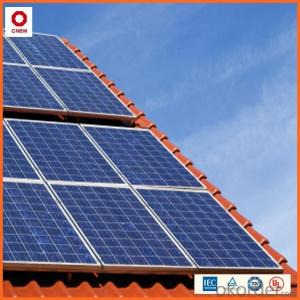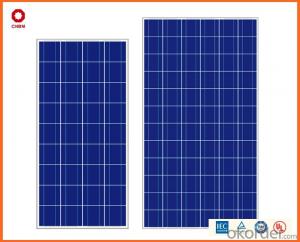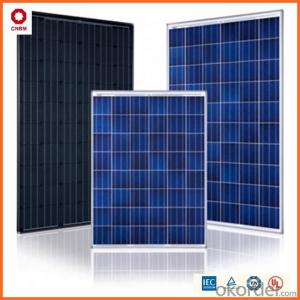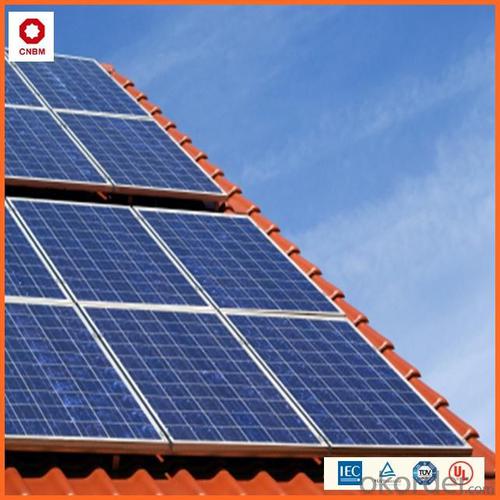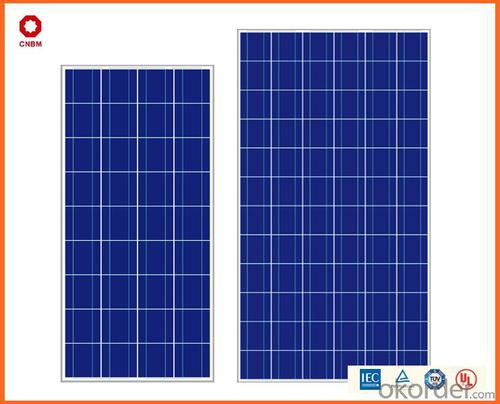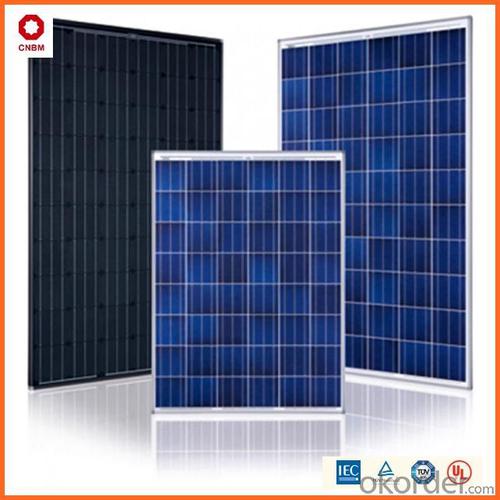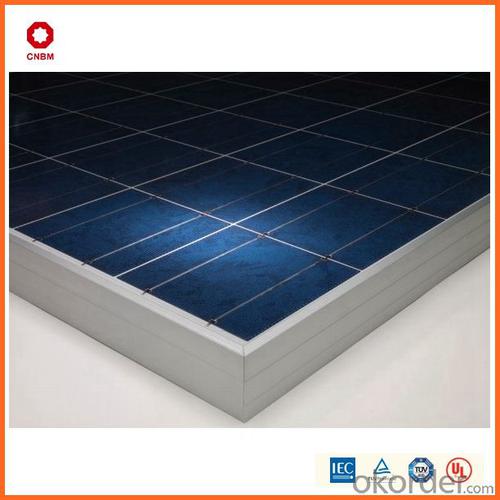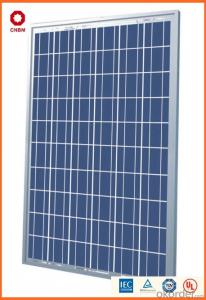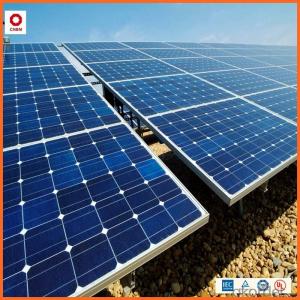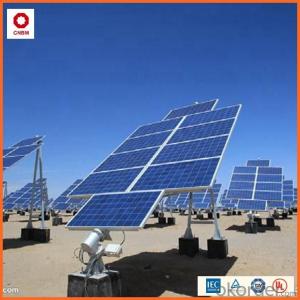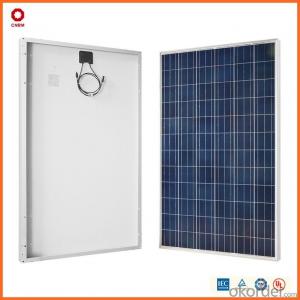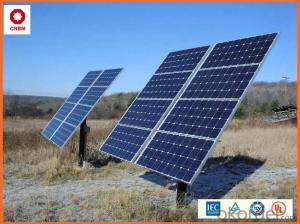Solair Solar Energy Systems - !!! Hot on Sale!!! Stock 260W Poly Solar Panel USD0.45/W A Grade Good Solar Panel
- Loading Port:
- China main port
- Payment Terms:
- TT OR LC
- Min Order Qty:
- 1 watt
- Supply Capability:
- 10000000 watt/month
OKorder Service Pledge
OKorder Financial Service
You Might Also Like
Product Description:
Hot Sale !!! Quality and Safety of 245w-320w Poly Solar Panel
1. Rigorous quality control meets the highest international standards.
2. High-transmissivity low-iron tempered glass, strong aluminium frame.
3. Using UV-resistant silicon.
4. IS09001/14001/CE/TUV/UL
Warranties of 245w-320w Poly Solar Panel
1. 10 years limited product warranty
2. 15 years at 90% of the minimal rated power output
3. 25 years at 80% of the minimal rated power output
Technical date of 245w-320w Poly Solar Panel
ITEM NO.: | Mono 125*125 cell ,36pcs . Power range from 80Wp-100Wp | ||||||||
Maximum Power(W) | 80 | 85 | 90 | 95 | 100 | ||||
Optimum Power Voltage(Vmp) | 17.81 | 17.89 | 17.94 | 17.99 | 18.06 | ||||
Optimum Operatige Current(Imp) | 4.78 | 4.91 | 5.12 | 5.35 | 5.59 | ||||
Open Circuit Voltage(Voc) | 21.98 | 22.05 | 22.14 | 22.28 | 22.45 | ||||
Short Circuit Current(Isc) | 4.95 | 5.15 | 5.36 | 5.65 | 5.84 | ||||
Solar Cell: | 125*125 Mono | ||||||||
Number of Cell(pcs) | 4*9 | ||||||||
Brand Name of Solar Cells | JA Cell, Bluesun Cell | ||||||||
Size of Module(mm) | 1580*808*35 | ||||||||
Caple & Connector Type | Pass the TUV Certificate | ||||||||
Frame(Material Corners,etc.) | Aluminium-alloy | ||||||||
Backing (Brand Type) | TPT | ||||||||
Cell Efficiency for 100W(%) | 15.8% | ||||||||
Weight Per Piece(KG) | 12.0KG | ||||||||
FF (%) | 70-76% | ||||||||
Junction Box Type | Pass the TUV Certificate | ||||||||
Tolerance Wattage(e.g.+/-5%) | ±3%, or 0-3% | ||||||||
Front Glass Thikness(mm) | 3.2 | ||||||||
Temperature Coefficients of Isc(%) | +0.04 | ||||||||
Temperature Coefficients of Voc(%) | -0.38 | ||||||||
Temperature Coefficients of Pm(%) | -0.47 | ||||||||
Temperature Coefficients of Im(%) | +0.04 | ||||||||
Temperature Coefficients of Vm(%) | -0.38 | ||||||||
Temperature Range | -40°C to +85°C | ||||||||
Surface Maximum Load Capacity | 2400Pa | ||||||||
Allowable Hail Load | 23m/s ,7.53g | ||||||||
Bypass Diode Rating(A) | 12 | ||||||||
Warranty | 90% of 10 years,80% of 25 years. | ||||||||
Standard Test Conditions | AM1.5 1000W/ 25 +/-2°C | ||||||||
Packing | carton or pallet | ||||||||
1*20' | 25 Pallets / 450pcs | ||||||||
1*40'STD | 25 Pallets / 100pcs | ||||||||
Features of our products:
• High conversion efficiency mono/poly-crystalline amorphous silicon solar cells
• Modules incorporate high performance bypass diodes to minimize the power drop caused by shading
• High transmittance, low-iron tempered glass
• High performance EVA encapsulant to prevent destroying and water.
• AI frame: without screw, corner connection. 8 holes on the frame can be installed easily
• Good performance of preventing from atrocious weather such as wind and hails
• Certifications: CE IEC TUV VDE UL, Class I
• 10 years 90% power output warranty

Shipping of 245w-320w Poly Solar Panel
By Sea | Delivery from Shanghai or Ningbo seaport |
By Air | Departure from Shanghai Pudong Airport |
By Express | Post by DHL, EMS, UPS, TNT. |
- Q: How do solar energy systems impact energy access in developing countries?
- Solar energy systems have a significant positive impact on energy access in developing countries. These systems provide a sustainable and reliable source of electricity, especially in regions with limited or no access to the traditional grid. By harnessing the abundant sunlight, solar energy systems help bridge the energy gap, bringing power to remote communities, schools, hospitals, and households. This not only improves the quality of life for individuals but also supports economic development, enhances educational opportunities, and enables access to essential services such as healthcare and communication. Additionally, solar energy systems reduce reliance on fossil fuels, mitigating environmental pollution and combating climate change. Overall, solar energy systems play a crucial role in expanding energy access, empowering communities, and fostering sustainable development in developing countries.
- Q: Are there any noise concerns associated with solar energy systems?
- While solar energy systems are generally quiet, there are potential noise concerns associated with certain components of the system. The most common source of noise in solar energy systems is the inverter, which converts the direct current (DC) electricity generated by the solar panels into alternating current (AC) electricity that can be used in homes or businesses. Inverters can emit a low humming noise, similar to that of a refrigerator or air conditioning unit, but the noise level is typically very low and not considered disruptive. However, advancements in technology have led to the development of quieter inverters that produce minimal noise. Some inverters are designed with noise reduction features such as soundproof enclosures or fans with low noise levels. Additionally, the location of the inverter can play a role in minimizing noise concerns. Placing the inverter in a well-insulated area, away from living spaces, can further reduce any potential noise disturbances. It's worth noting that other components of a solar energy system, such as the mounting structures or wiring, do not produce any significant noise. Solar panels themselves do not generate noise as they rely on sunlight to generate electricity rather than any moving parts. Overall, while there may be some noise concerns associated with certain components of solar energy systems, advancements in technology and proper installation practices have significantly minimized any potential disruptions.
- Q: How do solar energy systems impact the reliability of the electricity grid?
- Solar energy systems can have both positive and negative impacts on the reliability of the electricity grid. On one hand, solar energy systems can enhance grid reliability by diversifying the energy sources and reducing reliance on traditional fossil fuel-based generation. This can help to mitigate the risk of disruptions caused by fuel supply shortages or price fluctuations. Additionally, solar energy systems can often be installed at or near the point of energy consumption, reducing transmission and distribution losses and improving overall system efficiency. On the other hand, solar energy systems also present challenges to grid reliability. As solar power generation is intermittent and dependent on weather conditions, grid operators need to manage fluctuations in solar output to ensure a stable electricity supply. This requires the integration of smart grid technologies, energy storage systems, and advanced forecasting methods to balance supply and demand. Failure to effectively manage these challenges can result in voltage fluctuations, grid instability, and potential grid failures. Overall, with proper planning, grid integration, and technological advancements, solar energy systems can positively contribute to the reliability of the electricity grid. However, careful management and investment in grid infrastructure and energy storage solutions are essential to address the intermittency issues associated with solar power generation.
- Q: Can solar energy systems be installed on mobile homes?
- Yes, solar energy systems can be installed on mobile homes. In fact, they are a popular choice for mobile homeowners looking to reduce their reliance on traditional energy sources and lower their carbon footprint. Solar panels can be mounted on rooftops or on the ground near the mobile home, providing a sustainable and renewable source of electricity.
- Q: Can a solar energy system store excess energy for later use?
- Yes, a solar energy system can store excess energy for later use. This is achieved through the use of batteries or other storage technologies. When a solar energy system generates more electricity than is needed in real-time, the excess energy can be stored in batteries. These batteries can then be used to power the system during periods of low solar generation, such as at night or during cloudy days. By storing excess energy, solar energy systems can provide a more reliable and continuous power supply, reducing the dependence on the grid and increasing self-consumption of renewable energy.
- Q: Can solar energy systems be used for powering agricultural machinery?
- Yes, solar energy systems can be used for powering agricultural machinery. Solar panels can generate electricity which can be used to power various farm equipment such as irrigation pumps, grain dryers, and tractors. This helps reduce dependence on fossil fuels, lowers operating costs, and promotes sustainable agricultural practices.
- Q: How do solar energy systems impact water consumption?
- Solar energy systems can have a positive impact on water consumption as they typically require minimal water for operation compared to traditional energy sources. Solar panels do not need water to generate electricity, unlike fossil fuel power plants that use large amounts of water for cooling purposes. Thus, solar energy systems help conserve water resources and contribute to a more sustainable and efficient energy production process.
- Q: Can a solar energy system be installed on a warehouse or industrial facility?
- Yes, a solar energy system can be installed on a warehouse or industrial facility. In fact, these types of buildings are often ideal for solar installations due to their large roof spaces and ample sunlight exposure. Installing solar panels on a warehouse or industrial facility can help reduce energy costs, decrease reliance on grid electricity, and contribute to a more sustainable and environmentally friendly operation. Additionally, solar energy systems can provide a backup power source during grid outages, ensuring continuous operations in critical industrial processes. With the advancements in solar technology and the availability of various financing options, it has become increasingly feasible and cost-effective to install solar energy systems on warehouses and industrial facilities.
- Q: Can solar energy systems be used in camping or outdoor activities?
- Yes, solar energy systems can definitely be used in camping or outdoor activities. In fact, solar power is a great solution for off-grid living or when you're away from traditional power sources. Portable solar panels, also known as solar chargers, can be used to harness the sun's energy and convert it into electricity to power various camping or outdoor devices. There are several advantages of using solar energy systems for camping. Firstly, they provide a renewable and sustainable source of power, reducing your reliance on fossil fuels or disposable batteries. This not only helps to protect the environment but also saves you money in the long run. Solar energy systems can be used to charge a wide range of devices, such as smartphones, tablets, laptops, cameras, portable speakers, and even small appliances like coolers or lights. This ensures that you can stay connected, capture memories, or simply enhance your camping experience without worrying about battery life. Portable solar panels are lightweight, compact, and easy to carry, making them ideal for camping or outdoor activities. They can be set up in various ways, including attaching them to a backpack, placing them on the ground, or mounting them on a tent or RV. Some solar chargers also come with integrated batteries, allowing you to store energy for later use, ensuring a constant power supply even during cloudy days or at night. It is worth mentioning that the efficiency and power output of solar energy systems can vary depending on factors like weather conditions, panel quality, and the angle at which they are positioned towards the sun. Therefore, it's important to choose reliable and reputable solar products that suit your specific needs. Overall, solar energy systems are a fantastic option for camping or outdoor activities, providing a clean, reliable, and sustainable source of power. Whether you want to charge your devices, light up your campsite, or power small appliances, solar power can greatly enhance your outdoor experience.
- Q: Can a solar energy system be installed on a residential apartment complex?
- Yes, a solar energy system can be installed on a residential apartment complex. In fact, many apartment complexes are already utilizing solar energy systems to generate electricity. These systems can be installed on the rooftop of the apartment building or on a ground-mounted structure nearby, depending on the available space and sunlight exposure. By installing a solar energy system, apartment complexes can reduce their reliance on traditional grid electricity, lower their carbon footprint, and potentially save on electricity costs. Additionally, residents can benefit from reduced energy bills and increased sustainability. However, it is important to consider factors such as local regulations, building structure, and ownership arrangements when planning to install a solar energy system on a residential apartment complex.
Send your message to us
Solair Solar Energy Systems - !!! Hot on Sale!!! Stock 260W Poly Solar Panel USD0.45/W A Grade Good Solar Panel
- Loading Port:
- China main port
- Payment Terms:
- TT OR LC
- Min Order Qty:
- 1 watt
- Supply Capability:
- 10000000 watt/month
OKorder Service Pledge
OKorder Financial Service
Similar products
Hot products
Hot Searches
Related keywords
